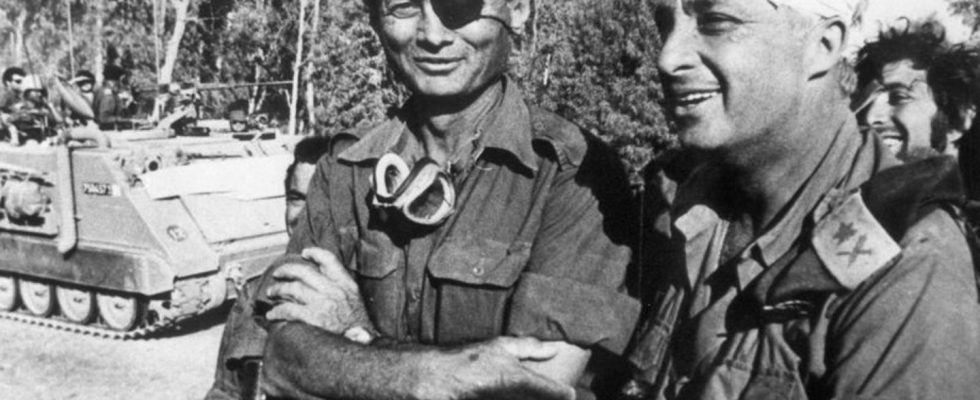The trauma of the Yom Kippur War runs deep in Israel. On October 6, 1973, Arab neighbors unexpectedly attacked the Jewish state. Decades later, the country faces renewed threats.
When an Israeli president compares the situation in the country with the Yom Kippur War 50 years ago, it makes people sit up and take notice. “The price could be unbearable again, we are facing another test. As if we had learned nothing,” said Izchak Herzog at a commemorative event to mark the anniversary. The only difference is that the threat now comes not from outside but from within, said the president.
To date, hardly any war in Israel has left such a deep mark on the collective memory as the one that began on Yom Kippur on October 6, 1973. On the most important Jewish holiday, an alliance of Arab states led by Egypt and Syria unexpectedly attacked an unprepared country. More than 2,600 Israeli soldiers were killed and more than 7,000 injured. The horror of that time and the question of whether the 19-day war could have been prevented still concerns people in Israel.
While the Israeli troops came out of the Six-Day War confident and cocky, the Yom Kippur War showed the vulnerability of the then young country, says Israeli expert Ejal Zisser from Tel Aviv University. Even Israel’s eventual victory did not change that.
Massive failures of the security apparatus
What followed was a crisis of trust in the political and military leadership. The then Prime Minister Golda Meir and Defense Minister Moshe Dayan resigned. An investigative commission found massive failures in the security apparatus. It was later said that warnings were not passed on in a timely manner and were not taken seriously enough.
“We must never, ever be unprepared,” warns Israel’s president today. “We must not fall into arrogance, with a lack of deterrence and a lack of warning.” It is not Herzog’s first appeal of this kind. For months, the head of state has been warning Israeli decision-makers of an existential crisis with potentially dramatic consequences for Israel’s security.
The trigger is a judicial restructuring pushed forward by Prime Minister Benjamin Netanyahu’s government. The comprehensive legislative proposal has been dividing large parts of Israeli society since the beginning of the year. The gaps that already exist between the secular majority and the strict religious minority are widening ever deeper. The liberal part of Israel in particular is afraid of fundamental changes in the country.
Controversial judicial reform
Several government parties represent strict religious views. They campaign for exemption from military service for ultra-Orthodox men or more gender segregation in public. The so-called judicial reform is intended to help ensure that the Supreme Court can no longer take action against the controversial projects.
This year’s Yom Kippur events were also overshadowed by the crisis. Violent clashes broke out in several cities on the holiday at the end of September. Secular and left-wing activists challenged barriers to gender segregation in prayer. A court had previously banned installation in public spaces. However, strict religious groups opposed the ruling.
After the incidents, Herzog spoke of a painful and shocking example of how the internal struggle escalates and becomes more and more extreme. “How could this terrible situation arise in which, 50 years after the bitter war, brothers and sisters on both sides of the divide are attacking each other?”
Resistance to government policy is also emerging within the military. Thousands of reservists, who make up a large part of the military, no longer want to serve voluntarily. Warnings about a weakened army like before Yom Kippur in 1973 are repeatedly mentioned in public discourse.
Tehran rubs its hands
According to security experts, the first effects are already visible. Israel’s arch-enemy Iran and its proxies in the region have been testing for months how far they can go, says Chuck Freilich of the Israel Institute for Security Studies. They couldn’t believe their eyes. “Never in their dreams could they have imagined that something like this would happen.”
The head of the Hezbollah militia in Lebanon, which is closely linked to Iran, Hassan Nasrallah, said in a recent speech that Israel was in the worst situation it had ever experienced because of the “domestic political division.” He listed a number of possible targets, such as airports or the electricity and water networks, that the militia could destroy in the event of an armed conflict. Similar threats have also come from Iran’s President Ebrahim Raisi, according to whom Israel is “more vulnerable than ever.”
Despite the danger, experts like Zisser and Freilich agree that a scenario like that on Yom Kippur 1973 is unlikely. Israel’s military has learned its lessons and is now one of the strongest armies in the world, says Zisser. In the event of an acute threat from outside, the reservists would “probably” be ready.
Freilich also says that it is difficult to compare then and now. “But that doesn’t make the situation any less bad at the moment,” he says and warns that it’s not being taken seriously enough. “On Yom Kippur there was a failure of the intelligence services, mistakes were made, better decisions were necessary, but here the warnings are written big and wide on the wall.”

